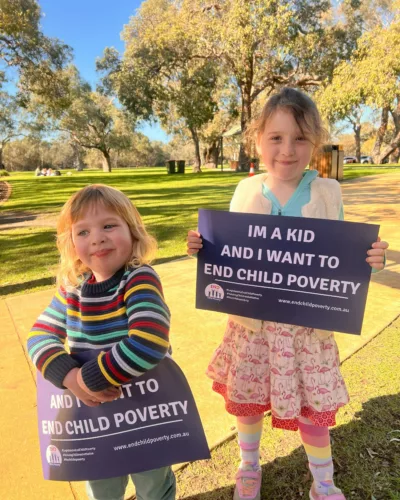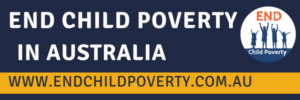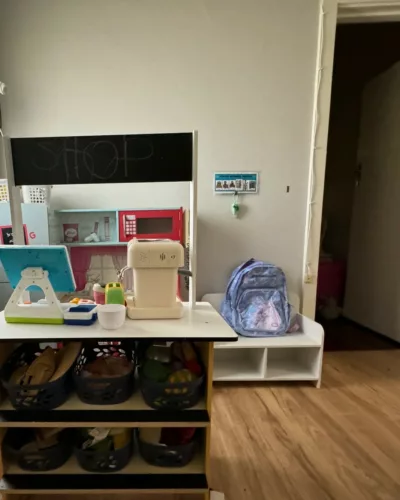
We have launched a campaign, End Child Poverty, calling on all Governments, state and federal, to legislate an end to child poverty. #
We are calling on the Federal Government to:
#
·Legislate an end to child poverty
·Include children as a priority in the Measuring What Matters national wellbeing framework
By pledging your support for the campaign, you pledge to:
Raise awareness to End Child Poverty within your organisation
·Share surveys, social media tiles, petitions and our website
·Talk to other organisations and individuals to join this community campaign. #
Your organisation will get:
·Proudly display your logo or name on our website
·Resources to share. #
Join Us! CLICK HERE to go to the End Child Poverty website to learn more
#

Make a Pledge Donate to the End Child Poverty Campaign

Children in poverty need urgent recognition and action from adults. #
It's time for society to acknowledge the gravity of their situation and demand policy changes that prioritise childrens' well-being.
We are calling on the Australian government to legislate an end to child poverty. Legislation will serve as a pivotal roadmap towards reducing child poverty.
All Australian children deserve a resolute commitment from political leaders. Leaving Australian children in poverty is a conscious policy choice, one that must be challenged and changed.
Support our mission to create a brighter future for all children. Children Need Our Commitment.
Download End Child Poverty Communications Kit Research and Resources End Child Poverty Campaign

Why legislate an end to child poverty? #
While the statistics on child poverty in Australia are alarming, they are not accurate, localised, or up-to-date. Legislation to end child poverty would measure, inform, and transparently report real-time statistics about child poverty so we as a whole community can take action and target services where and when children need them.
Reporting to Parliament every year, governments are held accountable to targets, while providing transparency to the community about the extent of child poverty. When considering initiatives in the Budget, Governments of all levels would then be required to give greater focus to the wellbeing of children in Australia.
See End Child Poverty Campaign Partners Join The End Child Poverty Campaign
The existence of child poverty in Australia is undeniable with one in six children living below the poverty line. In real numbers, that’s 761,000 Australian children living in poverty. -1
A child who lives in poverty is 3.3 times as likely to live in poverty as an adult. -2
References:
1 Davidson, P; Bradbury, B; and Wong, M (2023) Poverty in Australia 2023: Who is affected? Australian Council of Social Service (ACOSS) and UNSW Sydney.
2 Does poverty in childhood beget poverty in adulthood in Australia? by Dr Esperanza Vera-Toscano & Professor Roger Wilkins, Melbourne Institute: Applied Economic & Social Research, 2020.
Alongside the material elements of poverty such as housing, food security, clothing, access to health and mental health care, education opportunities, income and employment, children also experience poverty as ‘missing out’ on something non-material. Current approaches don’t consider ‘non-material’ poverty experienced by children. Children also require having their social and emotional needs met as well. Children who experience poverty can describe it as having no more than one pair of shoes, causing shame, losing their teddy because they had to move house so many times, causing grief, missing their friends from school because they’ve changed schools five times and not having that one person who cares about them and ultimately feeling lonely and unsafe. You cannot end child poverty without addressing ‘non-material’ poverty for children. And you can’t end all poverty, without addressing child poverty.
Giving children a voice is essential.
We must ask children how they experience poverty both material and non-material, which will inform governments and community on how best to respond, ensuring children are seen in their own right, separate from adult poverty.
All forms of poverty deny children their human rights. They are completely reliant on adults to ensure those rights are upheld.
Ending child poverty requires systemic policy drivers to be permanently set in law, so we can change the generational cycle of all poverty forever.
The negative impact of poverty on a child’s development and life outcomes is significant, well documented and can last a lifetime. Poverty effects a child’s health, mental health and wellbeing.
Kids growing up in poverty too often go to bed or school hungry, they can feel left out if they can’t join a local sport team or go on school camps, they may be living in an overcrowded home where there’s no quiet place to do homework and they worry about their parents. Multiple studies have found that poverty isn’t just about not having enough to eat and a secure home. A lack of money limits children and young people’s lives and learning and seeps into other aspects of their life. Children at the forefront of the housing crisis are often frequently moving due to high rents, which disrupts school and friendships.
Head to VCI's Knowledge Hub to read to update to research and reports on Child Poverty in Australia. Research & Reports

